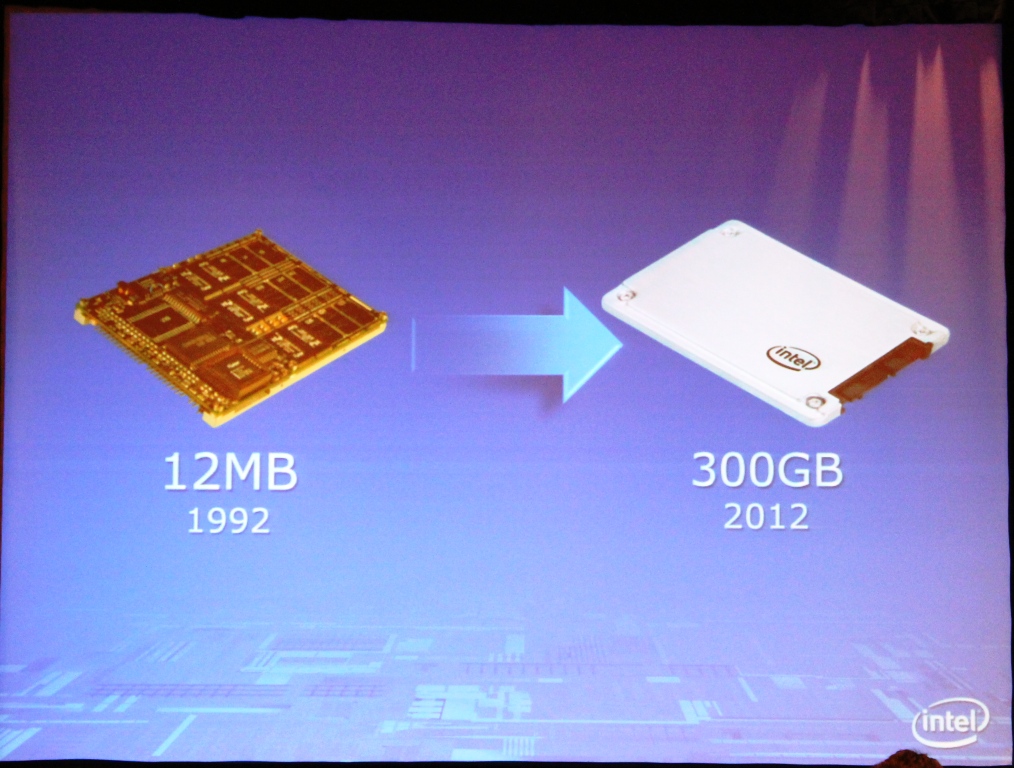Today Intels’ Robert Crooke, Corporate VP and GM of the NVM (Non-Volatile Memory) Solutions Group, delivered an impressive Keynote speech.
To keep things in perspective, one must recall that Intel has been in the SSD Flash manufacturing market for some time. Intel has been developing this type of solution since 1992 and time has brought about many changes and advancements.
This is clearly evidenced by the fact that Intels first production SSD utilized a PATA interface, and weighed in at a whopping 12 MB of storage. Today’s’ production SSD has 20,000 times the capacity of its ancestor!
 Much ado is made about the fact that CPU and Memory bandwidths have grown at exponential rates over the years. This is very important of course, but latency can be a much larger consideration to the end user. That is what we perceive as “waiting” verse instant performance. The graph below makes a comparative statement to the massive increases in SSD latency over the last few years.
Much ado is made about the fact that CPU and Memory bandwidths have grown at exponential rates over the years. This is very important of course, but latency can be a much larger consideration to the end user. That is what we perceive as “waiting” verse instant performance. The graph below makes a comparative statement to the massive increases in SSD latency over the last few years.
It is obvious that the bandwidth, and most importantly the latency, of SSDs have improved extremely quickly outstripping the others. The latency performance has exploded, which reaps huge results for end users.
I have to agree that SSDs aren’t “Business As Usual!” when taken in comparison to other key computer components.
 One of the largest selling points of Intels’ Enterprise class SSDs is the TCO, or Total Cost of Ownership. It is easy to see why, with the long term costs of SSDs v HDDs in an enterprise scenario being ridiculously cheaper.
One of the largest selling points of Intels’ Enterprise class SSDs is the TCO, or Total Cost of Ownership. It is easy to see why, with the long term costs of SSDs v HDDs in an enterprise scenario being ridiculously cheaper.
 One of the most important aspects of the growth of the SSD market is adoption of these devices into the consumer space. Today SSDs are present in only 5% of notebooks and tablets. An astounding number that speaks to the potential of this market to grow exponentially, with adoption currently slated to be at 10-15% by 2015. This can of course be accelerated, especially if the oft-mentioned ultrabooks take off in huge numbers.
One of the most important aspects of the growth of the SSD market is adoption of these devices into the consumer space. Today SSDs are present in only 5% of notebooks and tablets. An astounding number that speaks to the potential of this market to grow exponentially, with adoption currently slated to be at 10-15% by 2015. This can of course be accelerated, especially if the oft-mentioned ultrabooks take off in huge numbers.
Of uber importance here is Intels admission that they will be backing and utilizing the NVM Express specification. With PCIe SSDs there is a coming “war of specifications” so to speak, with several players lining up to become the industry standard. The current specification has several drawbacks to the performance of PCIe SSD devices and controllers, so there is an urgent need to find a suitable advancement, or totally different specification for use. It is clear Intel is intent upon utilizing NVMe for its future devices.
 We caught up with Robert Crooke, VP and GM of Intels NVM Corporate Group for some further questions after his speech.
We caught up with Robert Crooke, VP and GM of Intels NVM Corporate Group for some further questions after his speech.
 Intel has made a commitment to outfit every single one of their 90,000+ employees with SSDs. This is a company that truly believes in the capability and performance of its very own products. One of the key aspects in this move is their desire to reach a 100% data encryption requirement for all of their employees. SSDs allow this to happen without any loss of performance from the host machine.
Intel has made a commitment to outfit every single one of their 90,000+ employees with SSDs. This is a company that truly believes in the capability and performance of its very own products. One of the key aspects in this move is their desire to reach a 100% data encryption requirement for all of their employees. SSDs allow this to happen without any loss of performance from the host machine.
During the keynote Mr. Crooke informed us that since adoption of SSDs amongst their entire corporation, their internal numbers from their IT team indicates that they have experienced a 96% reduction company-wide in storage related failures. This is a powerful testament to the reliability and longevity of SSDs in the corporate environment.
A 96% reduction is phenomenal, and after the speech we spoke about their previous failure rate and more specific numbers. The previous storage-related failure rate was 4.7 percent, and their current rate of storage related failures are much lower than 1 percent. Intel is at the point now where they are having a hard time finding any employees that still have HDDs in their systems, and see a future where the same holds true for us consumers as well.
Intel is forecasting a great year ahead for the SSD market, and we agree!
 The SSD Review The Worlds Dedicated SSD Education and Review Resource |
The SSD Review The Worlds Dedicated SSD Education and Review Resource | 
Did Intel happen to mention in your chat the overdue/delayed 520 series SSDs?
Still under NDAs?
Silence is golden 😉